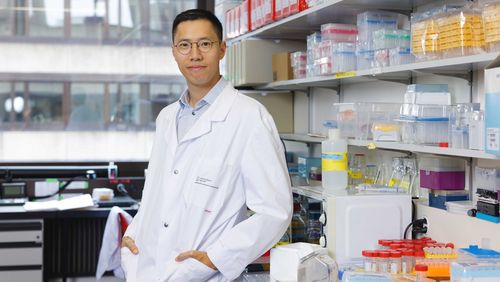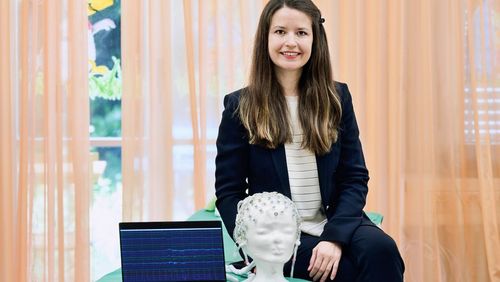
Healthy business
The path from academia to entrepreneurship is long and arduous—not least in the field of medical technology. To help pave the way for first-time entrepreneurs, the Werner Siemens Foundation is sponsoring the MedTechEntrepreneur Fellowship at the University of Zurich. The funding programme supports talented junior researchers who want to establish a medical technology firm.
A whole 10 years can pass before a medical technology firm can sell a product—the start-up investments are substantial, and the regulatory procedures complex and expensive. This means that many medical discoveries languish in universities, even though they have the potential to help many people. In order to change this, the University of Zurich established the MedTechEntrepreneur Fellowships. The funding programme, which is sponsored by the Werner Siemens Foundation, supports junior scholars at the University of Zurich who would like to found a medical technology spin-off company. The first Fellowships were awarded in the summer of 2018. Five projects from the areas of cancer research, regenerative medicine, molecular biology, and cell and tissue engineering were submitted. The two successful applications are now being supported with funding of 150 000 Swiss francs. One of the first Fellows is biotechnologist Yannick Devaud, aged 30. In a discussion with entrepreneur Daniela Marino, aged 36, he learns what will make the difference when establishing his spin-off company. Like Devaud, Marino once studied biotechnology. In March 2017, she founded her own firm: Cutiss AG.
Yannick Devaud, in July 2018 you were awarded one of the first MedTechEntrepreneur Fellowships sponsored by the Werner Siemens Foundation. How will you use the funds?
Yannick Devaud: When surgery is carried out on pregnant women, the membrane of the amniotic sac is frequently damaged. This leads to premature births, which the babies often don’t survive. My aim is to protect the membrane by applying a kind of sticking plaster after surgery. During my doctoral studies at the University of Zurich, I developed a device that makes this possible; now I want to develop it further. The 150 000 Swiss francs will be used mainly to pay my salary for the next 18 months.
What are the next steps for you in becoming an entrepreneur?
Yannick Devaud: First of all, I’ll develop and test the prototype. In spring 2019, the first experiments on sheep should be possible. If these succeed—and only if—then I aim to found my spin-off towards the end of 2019. The first tests on humans should be possible as soon as all of the approval procedures are complete—probably in about three to four years.


Daniela Marino, you work in a related area. Your firm Cutiss AG produces personalised skin transplants for burn patients or patients who have had tumours removed. You established your firm about 18 months ago; today, 10 people work for you. What made you decide to become an entrepreneur?
Daniela Marino: Helping people was always the aim of my research. And to make that happen, there was simply no other option but to turn the research project into a spin-off. After all, publications in specialist journals alone don’t change anything for patients. And pharmaceutical companies don’t buy ideas that haven’t been extensively tested—the risk for them is simply too great. I made the decision to found a spin-off overnight, and I’ve never regretted it. I wake up every morning with a smile on my face.
Establishing a spin-off involves a great deal of work. What were the biggest challenges?
Daniela Marino: The most difficult thing for me was building a network. As a researcher, I was accustomed to working alone in my lab—far removed from the outside world.
Would you do things differently today?
Daniela Marino: Yes, I would spend more time at networking events, even if they’re sometimes a chore. With a spin-off firm, you have no money to pay specialists. And that means you’re dependent on your network. People who simply want good ideas to be realised—who work pro bono—really do exist; we just have to go out and find them.
Is networking difficult for you, Yannick Devaud?
Yannick Devaud: Fortunately, I don’t really mind approaching strangers and asking stupid questions.
Daniela Marino: You greeted me in the hallway before—for a moment I thought we knew each other. That’s quite charming.
Yannick Devaud: What worries me more is the complicated work involved in the regulatory procedures, which can be torturous at times. But I am someone who likes to learn, and I have my sights set firmly on my goal: I want to save those babies. If that means working hard, attending courses and filing reams of paperwork, then I’m ready for that.
Daniela Marino, based on your experiences, what advice would you offer Yannick Devaud?
Daniela Marino: You should make a pretty package for potential investors as early as possible. Because sooner or later, you’ll need more money. What you put in that package is up to you, but it had better look very, very good.
Yannick Devaud: What do you mean?
Daniela Marino: What you need is a winning story. You have to show what the problem is and why you’re the one who can solve it. And the investors will want to see numbers: how many patients are affected, what the competition looks like and so on. Never think it is too
early. It all takes an awful lot of time, so it’s best to get started right away.
Daniela Marino, when you started out four years ago, there were no MedTechEntrepreneur Fellowships sponsored by the Werner Siemens Foundation. Would such funding have helped you?
Daniela Marino: Most certainly. It’s difficult to find support that extends beyond standard research funding. Regulatory procedures, for instance, can quickly cost up to 100 000 Swiss francs. But you’re not allowed to use designated funds for other purposes. We were very fortunate, however, as we received a substantial contribution from the EU.
How can such funding problems be solved?
Daniela Marino: I hope that some of Switzerland’s wealthier citizens open their eyes and see that there’s no point in hoarding millions. There are so many brilliant young people out there—I meet them every day. Why don’t we give them a chance to show what they’re made of? It’s not as if they were developing a new coffee machine. These young researchers can make a difference in society.
But surely there are venture capitalists who are willing to invest?
Daniela Marino: Of course, but they take advantage of people. They say, we’ll give you one million, and the firm is ours. That was never an option for me, nor would I recommend it.
Founding a spin-off also means becoming a manager. Yannick Devaud, can you imagine giving up your research work?
Yannick Devaud: I don’t mind if I’m never Switzerland’s greatest researcher; my abilities are well suited to the business world. But I’m also not someone who just wants to make a lot of money. If that was my aim, I would have taken a well-paid job in a large corporation. My goal is to help people. I want babies to stay healthy. That is a great motivation.
Interview: Andres Eberhard
Photos: Felix Wey







